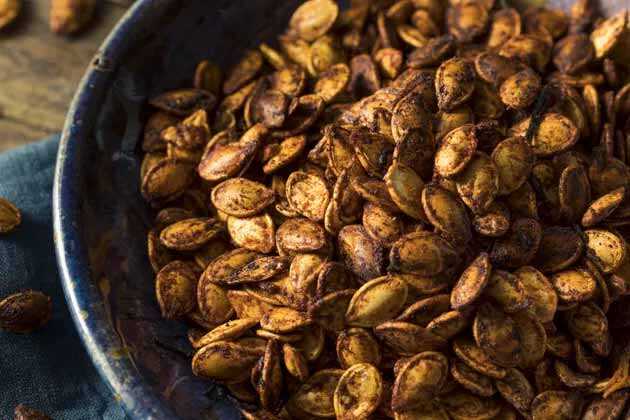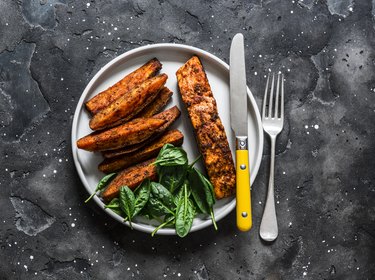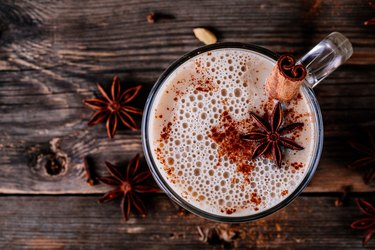
Your day is chugging along just fine — and then you receive that email. Or maybe you’re in a particularly busy season of life and your daily stress levels are higher than normal. One way you may choose to soothe your stress: with a snack. Or maybe takeout.
“While comfort foods may help with stress in the short term, longer term the effects don’t last and can lead to weight gain and poor health,” Melina Jampolis, MD, physician nutrition specialist and host of the podcast Practically Healthy by Dr. Melina, tells LIVESTRONG.com.
There are certain nutrients that will nourish a stressed-out body. Focus on “nutrient-dense foods rich in healthy fats, especially omega-3 fatty acids, along with lean protein, B vitamins and magnesium-rich foods to better manage chronic stress,” Dr. Jampolis says.
1. High-Fiber Foods
One of the types of stress-relieving foods you might automatically reach for are those that are rich in carbs. That’s not a bad thing. No shame about diving into a bag of cookies at this time, but there is a better way to support your mood. And that’s with high-fiber foods.
“High-fiber foods can help prevent a rapid rise and subsequent fall in blood sugar, which can exacerbate stress and increase cortisol,” Dr. Jampolis says.
In general, fiber-rich, blood sugar-balancing foods include:
- Fruits
- Vegetables
- Beans and lentils
- Whole grains like bulgur, brown rice, oatmeal and whole-wheat products
For instance, “if you want something like mashed potatoes, do mashed sweet potatoes and keep the skin on for added fiber,” Dr. Jampolis suggests. Also sprinkle on cinnamon for a sweet kick and to add polyphenols, she adds. (Dr. Jampolis is the author of Spice Up, Live Long.) Thanks to their anti-inflammatory and antioxidant properties, polyphenols were associated with better psychological wellbeing in adults with hypertension in an August 2020 study in Nutrients.
2. Magnesium-Rich Eats
Magnesium is an impressive nutrient. Truly. It plays a role in more than 300 reactions in the body, according to the National Institutes of Health (NIH). One of those? The mineral functions as a stress regulator — but it also becomes depleted by stress, points out Dr. Jampolis, citing a December 2020 review in Nutrients.
About half of Americans are getting less magnesium from their diet than they should, according to the NIH. (Adults should get 310 to 420 milligrams per day.)
- Pumpkin seeds
- Chia seeds
- Almonds
- Cashews
- Peanuts
- Cooked spinach
- Soymilk
- Black beans
- Edamame
3. Salmon

“Inflammation can reduce a brain chemical called BDNF, which can adversely affect your brain function, mood and anxiety levels,” Dr. Jampolis says.
Check any list of anti-inflammatory foods and you’ll find oily fish like salmon at the top. That’s because they’re full of omega-3 fatty acids, which has been shown to slow the production of inflammatory proteins in the body, per the Cleveland Clinic.
The Best Dinner to Eat When You’re Stressed
When it comes to stress-busting foods, one of the best meals you can eat contains grilled salmon, mashed sweet potatoes, sauteed mushrooms with thyme and leafy greens with olive oil. Together, they supply a host of things your brain is craving right about now:
-
Grilled salmon: Blood-sugar stabilizing protein and anti-inflammatory omega-3 fatty acids
-
Sweet potatoes: Low-glycemic index carbohydrates
-
Leafy greens: Stress-regulating magnesium
-
Olive oil: Anti-inflammatory monounsaturated fats
-
Mushrooms: Vitamin D (Improving vitamin D levels has been shown to improve mood and quell anxiety, according to a small study in the International Journal of Preventative Medicine in February 2019, notes Dr. Jampolis.)
4. Dark Chocolate
For sweet cravings, fruit is one of those foods that help with stress. (Fruits are chock-full of fiber and rich in antioxidants.) However, sometimes fruit isn’t enough and you want a true dessert.
“Dark chocolate is a good choice because it has fat, fiber and polyphenols, which may support healthy brain function,” Dr. Jampolis says.
Go ahead and break off a square or two from your favorite bar (one with more than 70 percent cacao) or whip up whole-wheat muffins with dark chocolate pieces for a mid-day pick-me-up that hits that craving for sweet and carb-y.
5. Low-Caffeine Drinks

“Tea is great for stress, as it contains theanine, a calming chemical found in green tea,” Dr. Jampolis says. What’s more, tea is warm, which enhances its comfort level, she says.
Other options Dr. Jampolis likes include:
- Homemade hot cocoa made with cocoa powder, low-fat or non-dairy milk and stevia
- A chai latte (with chai tea, milk of choice and stevia)
Whipping up these drinks at home is quick and easy and saves on the excess sugar from buying them at a coffee shop.
What’s more, it may be beneficial to consume drinks with lower amounts of caffeine (compared to coffee) or their decaf versions, as caffeine can exacerbate the effects of stress and anxiety in some people and decrease sleep quality, which can indirectly prime you for a greater stress response, suggests a small June 2017 study in the Journal of Caffeine Research.
References:
- Nutrients: “A High Polyphenol Diet Improves Psychological Well-Being: The Polyphenol Intervention Trial (PPhIT)”
- Journal of Caffeine Research: “The Effect of Coffee and Caffeine on Mood, Sleep, and Health-Related Quality of Life”
- Nutrients: “Magnesium Status and Stress: The Vicious Circle Concept Revisited.”
- Cleveland Clinic: “Omega-3 Fatty Acids”
- International Journal of Preventative Medicine: “Effect of Vitamin D Supplement on Mood Status and Inflammation in Vitamin D Deficient Type 2 Diabetic Women with Anxiety: A Randomized Clinical Trial”
- National Institutes of Health: “Magnesium”
Important Notice: This article was originally published at www.livestrong.com by Jessica Migala where all credits are due. Reviewed by Colleen Neumann PsyD, MSW
Disclaimer
The watching, interacting, and participation of any kind with anything on this page does not constitute or initiate a doctor-patient relationship with Dr. Farrah™. None of the statements here have been evaluated by the Food and Drug Administration (FDA). The products of Dr. Farrah™ are not intended to diagnose, treat, cure, or prevent any disease. The information being provided should only be considered for education and entertainment purposes only. If you feel that anything you see or hear may be of value to you on this page or on any other medium of any kind associated with, showing, or quoting anything relating to Dr. Farrah™ in any way at any time, you are encouraged to and agree to consult with a licensed healthcare professional in your area to discuss it. If you feel that you’re having a healthcare emergency, seek medical attention immediately. The views expressed here are simply either the views and opinions of Dr. Farrah™ or others appearing and are protected under the first amendment.
Dr. Farrah™ is a highly experienced Licensed Medical Doctor certified in evidence-based clinical nutrition, not some enthusiast, formulator, or medium promoting the wild and unrestrained use of nutrition products for health issues without clinical experience and scientific evidence of therapeutic benefit. Dr. Farrah™ has personally and keenly studied everything she recommends, and more importantly, she’s closely observed the reactions and results in a clinical setting countless times over the course of her career involving the treatment of over 150,000 patients.
Dr. Farrah™ promotes evidence-based natural approaches to health, which means integrating her individual scientific and clinical expertise with the best available external clinical evidence from systematic research. By individual clinical expertise, I refer to the proficiency and judgment that individual clinicians acquire through clinical experience and clinical practice.
Dr. Farrah™ does not make any representation or warranties with respect to the accuracy, applicability, fitness, or completeness of any multimedia content provided. Dr. Farrah™ does not warrant the performance, effectiveness, or applicability of any sites listed, linked, or referenced to, in, or by any multimedia content.
To be clear, the multimedia content is not intended to be a substitute for professional medical advice, diagnosis, or treatment. Always seek the advice of your physician or other qualified health providers with any questions you may have regarding a medical condition. Never disregard professional medical advice or delay in seeking it because of something you have read or seen in any website, video, image, or media of any kind. Dr. Farrah™ hereby disclaims any and all liability to any party for any direct, indirect, implied, punitive, special, incidental, or other consequential damages arising directly or indirectly from any use of the content, which is provided as is, and without warranties.








